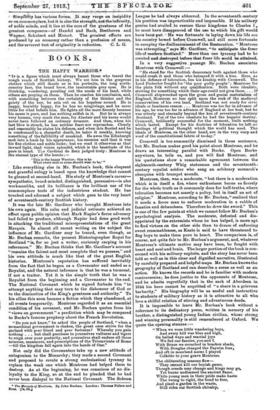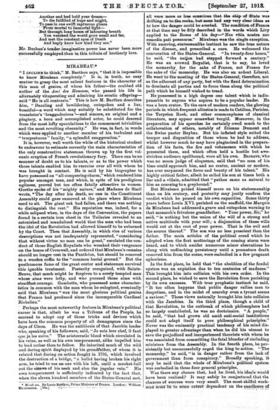BOOKS.
THE HAPPY WARRIOR.*
" IT is a figure which must always haunt those who travel the rough roads of Scottish history. We see him in the gorgeous clothes which still dazzle us in his portraits, the long north- country face, the broad brow, the inscrutable grey eyes. He is thinking, wondering, puzzling out the needs of his land, while others are preying on them. Then he reaches his conclusion, and, with something between the certainty of the thinker and the gaiety of the boy, he sets out on his hopeless errand. He is happy, boyishly happy, for he has no misgivings, and he cares little for what befalls him. He fights all the more fiercely because his cause is pure, and has nothing selfish in it. But he is always very human, very much the man, for Alastair and his hems would never have followed an ordinary dreamer. And then, when his last blow is struck, he has neither fears nor reproaches. Clearly and reasonably he states his defence, and when itAis flouted and he is condemned to a shameful death, he takes it meekly, knowing something of the fallibility of mankind. He awes the Edinburgh mob into a hush by his appearance; his enemies said that it was his fine clothes and noble looks ; but we read it otherwise as that inward light, that vision splendid, which is tho beatitude of the pure in heart. Ti.a Cardinal de Itetz judged truly : Montrose is the eternal type of the heroic :— 'This is the happy Warrior ; this is he What every man in arms should wish to be: "
• Like everything else in Mr. Buchan's book, this eloquent and graceful eulogy is based upon the knowledge that cannot be gleaned at second-hand. His study of Montrose's career— sympathetic, broad-minded, distinguished, persuasive—is also workmanlike, and its brilliance is the brilliant use of the commonplace tools of the industrious student. He has touched and adorned a subject which goes to the very heart of seventeenth-century Scottish history.
It was the late Mr. Gardiner who brought Montrose into 'his own again. His calm and judicial estimate achieved an effect upon public opinion that Mark Napier's fierce advocacy had failed to produce, although Napier had done good work in attacking the traditional misrepresentations of the great Marquis. In almost all recent writing on the subject the influence of Mr. Gardiner may be traced, even though, as Mr. Buchan remarks, the present Historiographer Royal for Scotland "is, for so just a writer, curiously carping in his references." Mr. Buchan thinks that Mr. Gardiner's account "remains the fairest and most complete that we possess," and his own attitude is much like that of the great English historian. Montrose's reputation has suffered inevitably from the fact that he began as a Covenanter and ended as a Royalist, and the natural inference is that he was a turncoat, if not a traitor. Yet it is the simple truth that he was a Royalist from the beginning and a Covenanter to the end. The National Covenant which he signed forbade him "to attempt anything that may turn to the dishonour of God or to the diminution of the King's greatness and authority." To his allies this soon became a fiction which they abandoned, at all events temporarily. Montrose regarded it as an essential condition of his covenant, and Mr. Buchan quotes from his "views on government" a prediction which may be compared to Burke's famous prophecy about the French Revolution.
"Do you not know," he asked the people of Scotland, "when a monarchical government is shaken, the great ones strive for the garland with your blood and your fortunes ? Whereby you gain nothing . . . but shall purchase to yourselves vultures and tigers to reign over your posterity, and yourselves shall endure all those miseries, massacres, and proscriptions of the Triumvirate of Rome —till the kingdom fall again into the hands of One."
Not only did the Covenanters take up a new attitude of antagonism to the Monarchy; they made a second Covenant and proposed to create a strong ecclesiastical tyranny to replace the weak one which Montrose had helped them to destroy. As at the beginning, he was conscious of no dis- loyalty to the King, so at the end he pleaded that be had never been disloyal to the National Covenant. The Solemn
• The Marquis of Montrose, By John Buchan. London; Thomas Nelson and Bons. Ln, N.}
League he had always abhorred. In the seventeenth century his position was impracticable and impossible. If his military genius had availed to restore three kingdoms to Charles I, he must have disapproved of the use to which his gift would have beet put. ' He was fortunate in laying down his life et e his country bowed before Cromwell, and still more fortunate in escaping the disillusionment of the Restoration. " Montrose was attempting," says Mr. Gardiner, "to anticipate the freer lifeof modern Scotland." - More than one tyranny had to be created and destroyed before that freer life °Quid be attained.
In a very suggestive passage Mr. Buchan associates Montrose with Cromwell :—
" He stood for the Scottish democracy both against those who would crush it and those who betrayed it with a kiss. Here, a.; in his defence of toleration, lies his kinship with Cromwell. The Lord Protector fought for 'the poor godly people' ; Montrose for the plain folk without any qualification. Both were idealists, striving for something which their age could not give them.. .. If Cromwell shipwrecked upon the gross and genial materialism of England, Montrose no less split upon the rock of the medieval conservatism of his own land. Scotland was not ready for civic ideals or luminous reason.... Montrose was too far in advance of his age, be was too far in advance of England at her best, but he was utterly and eternally beyond the ken of seventeenth-century Scotland. Yet of the two idealists he had the happier destiny_ Cromwell, brilliantly successful for the moment, built nothing which lasted. Except for his doctrine of toleration he left no heritage of political thought which the world has used. The ideals of Montrose, on the other band, are in the very warp and woof of the constitutional fabric of to-day."
Cromwell is too summarily dismissed in these sentences, but Mr. Buchan makes good his point about Montrose, and be draws an interesting parallel with Burke. Open Burke anywhere, he tells us, and you will find Montrose, and.
his quotations show a remarkable agreement between the eighteenth-century Whig statesman and the seventeenth. century royalist soldier who sang an arbitrary monarch's obsequies with trumpet sounds.
Montrose, then, was a moderate, "but there is a moderation which is in itself a fire, where enthusiasm burns as fiercely for the whole truth as it commonly does for half-truths, where
toleration becomes not merely a policy, but in itself an act of religion." Montrose, according to Mr. Buchan," realized that it needs a fierce man to enforce moderation in a rabble of fanatics and debauchees. Therefore he drew the sword." This is one of the few points at which we cannot follow Mr. Buchan's psychological analysis. The moderate, defeated and dis- appointed by the extremists whom he has helped, is more apt to find virtues on the other side than to dream of enforcing sweet reasonableness, as Keats is said. to have threatened to- flog boys to make them pure in heart. The comparison is, of course, not quite fair to Mr. Buchan's argument, and, whatever Montrose's ultimate motive may have been, he fought with heart and soul and brain. The larger portion of the book is con- cerned with his military exploits, and the story has never been told so well as in this clear and dignified narrative, illustrated by carefully prepared and helpful maps. Mr. Buchan knows the geography of Scotland and can describe a scene as well as an action. He knows the records and he is familiar with modern controversies; he does justice to the opponents of Montrose, and he admits regretfully that in the sack of Aberdeen in 1644 his hero cannot be acquitted of "a share in a grievous barbarity." His biography will be as useful and instructive to students of military history as it is attractive to all who- love a skilful relation of stirring and adventurous deeds.
It is impossible to leave Mr. Buchan's book without a reference to its dedicatory poem, written in memory of his brother, a distinguished young Indian civilian, whose strong and winning personality is still remembered at Oxford. We quote the opening stanzas :—
"When we were little wandering boys, And every hill was blue and high, On ballad ways and martial joys We fed our fancies, you and I.
With Bruce we crouched in bracken shade,
With Douglas charged the Paynim foes;
And oft in moorland noons I played Colkitto to your grave Montrose.
The obliterating seasons flow— They cannot kill our boyish game,
Though creeds may change and kings may go, Yet burns undimmed the ancient flame.
While young men in their pride make haste
The wrong to right, the bond to free, And plant a garden in the waste, Still rides our Scottish chivalry. Another end had held your dream—
To die fulfilled of hope and might, To pass in one swift rapturous gleam -
From mortal to immortal light—
But through long hours of labouring breath You watched the world grow small and far, And met the constant eyes of Death
And haply knew how kind they are."
Mr. Buchan's tender imaginative power has never been more vsuccessfully employed than in this tribute of brotherly love.











































 Previous page
Previous page